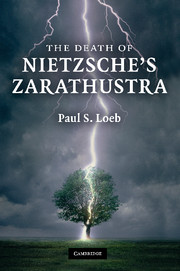Introduction
Published online by Cambridge University Press: 04 August 2010
Summary
In this study I aim to make significant new progress in solving the riddles of Thus Spoke Zarathustra by offering a new understanding of Nietzsche's well-known clue that the thought of eternal recurrence is its fundamental conception (Grundconception) or fundamental thought (Grundgedanke) (EH Z:1). Traditionally, commentators have understood this clue to mean that they should look in the text of Zarathustra for some kind of explication and defense of the thought of eternal recurrence. Or, more recently, and in a more literary vein, they have interpreted the narrative of Zarathustra as a kind of Bildungsroman in which Zarathustra learns how to awaken, confront, teach, and affirm his thought of eternal recurrence. But these scholars have been frustrated in their doctrinal approach because those places in Zarathustra where eternal recurrence is explicitly broached are few and isolated, leaving open the question as to how this thought is supposed to be the Grundgedanke of Nietzsche's artistic work as a whole. Also, these scholars have complained, the protagonist Zarathustra himself never seems to fully express, explain, prove, endorse, teach, or definitively affirm the thought of eternal recurrence. When Zarathustra does refer to this thought, he (or his soul) does so while dreaming or intoxicated or convalescent (or while recollecting such moments), and then usually in song. Otherwise, Nietzsche puts different, and seemingly incompatible, versions of the thought into the mouths of strange and apparently unqualified characters like the dwarf in the “Vision and the Riddle” chapter, or Zarathustra's animals in the “Convalescent” chapter, or the higher men in the “Awakening” chapter.
- Type
- Chapter
- Information
- The Death of Nietzsche's Zarathustra , pp. 1 - 10Publisher: Cambridge University PressPrint publication year: 2010



